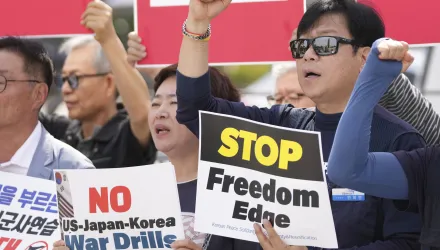International Security is America's leading peer-reviewed journal of security affairs.
Abstract
The next two articles take up the debate on the utility of economic sanctions as an effective instrument of foreign policy. In “Why Economic Sanctions Do Not Work,” published in the fall 1997 issue of International Security, Robert Pape of Dartmouth College challenged the findings in Economic Sanctions Reconsidered, a highly regarded and influential study that offered qualified optimism about the effectiveness of economic sanctions as a foreign policy tool. One of the study’s coauthors, Kimberly Ann Elliott of the Institute of International Economics, argues here that Pape mischaracterizes the principal objective of the work, which, according to Elliott, was to determine if and how economic sanctions contributed to desired foreign policy outcomes—not, as Pape contends, whether they caused them. Pape responds with a vigorous defense of his original findings.
Pape, Robert. “Why Economic Sanctions Still Do Not Work.” Summer 1998
The full text of this publication is available in the link below.





